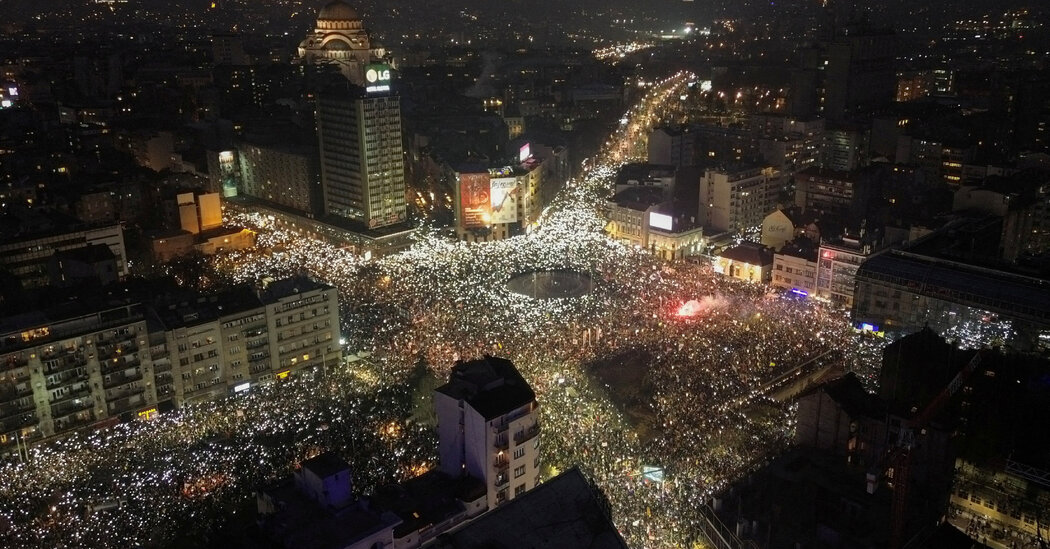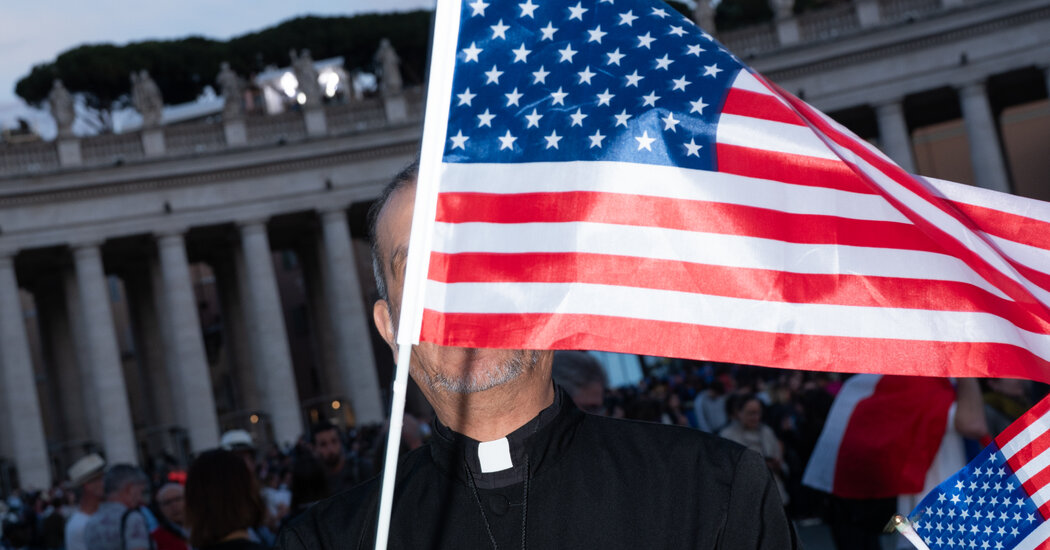Anjanette Young never wanted you to see the video.
It documents the worst night of her life, when 12 Chicago police officers burst into her home, with a warrant based on faulty information, and handcuffed her naked.
“My life before was just a quiet life,” Ms. Young told me. “I lived a very quiet and simple life and now my life has been completely turned upside down. I can’t sleep at night.”
Why would she want this life-altering trauma circulated for all the world to see? Why would she want us to hear her shouting to police officers, over 40 times, some form of “This is a mistake; you’ve got the wrong house”? Why would she want to relive the terror?
Because all too often today, a viral video is the most effective way for a person of color to find justice. And so after months of being brushed aside by the City of Chicago, Ms. Young and her lawyers released the bodycam footage of that awful night to the local news. Despite what the video has cost her in terms of privacy, dignity and emotional health, she believes that it was the right thing to do.
But I do wonder if it is right for us as a society to expect that level of sacrifice and vulnerability for already traumatized people to receive justice.
Ms. Young tells her story in a disciplined, measured tone. She is leery of the cynic in all of us. She knows that people hear her story, see her lawyers and think it is a money grab — as if she hoodwinked the City of Chicago into invading her home.
But despite her best efforts, her desperation seeps out. How could it not? She needs us to believe her when she says that she was normal before a single night changed her life. If we believe that she is a real person who had an ordinary life, then maybe we will believe that her desire for justice is genuine.
On Feb. 21, 2019, after a long day of work, Ms. Young was getting ready for an evening of comfort. As a medical social worker who dealt with the problems of others all day, she knew the importance of self-care. So she poured a glass of wine and got ready to watch one of her favorite television shows, “Grey’s Anatomy.”
She was getting undressed when she heard what she remembers as an “earth-shattering noise.” Frightened, she grabbed a small jacket and made her way to the front of the apartment. She was greeted by large guns, flashlights and the police demanding that she get her hands in the air.
Ms. Young was faced with a dilemma common to too many Black women: between her dignity and her life. The decision wasn’t conscious. She feared getting shot, so she threw her hands into the air and dropped the only thing covering her naked body. Within seconds, she was in her own home, handcuffed and naked in a room full of mostly white men.
They placed a blanket over her shoulders, but because her hands were cuffed behind her back, she could not wrap the blanket around herself. It hung open with the front of her body exposed for at least 10 minutes, until Officer Ella French took Ms. Young into her bedroom and allowed her to put on clothes. Ms. Young remembers Officer French as the first person that night who treated her with kindness and empathy. Tragically, Officer French would be shot and killed two and a half years later in the line of duty during a traffic stop.
Ms. Young remained handcuffed for approximately 10 more minutes while the officers searched her 1,200-square-foot, two-bedroom home. After they uncuffed her, they stayed for roughly another 40 minutes, still looking. They departed having found nothing.
Before this occurred, Ms. Young thrived at her job; she had worked at the same hospital for two years without any blemishes on her record. After the raid, she struggled at work. During the summer of 2019, she said, her employer put her on a 90-day corrective plan. By October she had been fired.
No longer feeling safe in her home, she moved. She was diagnosed with PTSD and depression. Sirens and loud noises give her panic attacks. The glass of wine before bed is gone. The medication she takes to deal with her depression and PTSD cannot be mixed with alcohol.
None of this needed to happen. The police obtained a warrant to raid her home after an informant reported seeing a man with an illegal weapon at what the police interpreted as Ms. Young’s address. Ms. Young would later discover that the man in question wore an ankle monitor. Those who battered down her door reportedly could have looked up his location and known that he was not in her home.
Ms. Young knew that she deserved better. She came from a family shaped by the faith and activism of the Black church. She remembers being told stories of her grandmother, Lucendia Young, marching with the Rev. Dr. Martin Luther King Jr. and other leaders engaged in civil rights work in Mississippi, where her family originated. There are also accounts of her grandmother working with Fannie Lou Hamer on voting rights in Mississippi.
Faced with an injustice, Ms. Young did what her family had always done. She turned to her faith community. The night of the raid her first call was to an associate minister at Progressive Baptist Church, a historic Black church in the city that hosted Dr. King in its pulpit. (My family and I have attended this church for the past four months, and I’m a friend of the senior pastor.)
The congregation has quite a few attorneys, and one of them (a civil rights lawyer) agreed to take the case, forgoing pay unless the suit is successful. That allowed Ms. Young legal representation that she probably would not have been able to afford on her own. Ms. Young said she believes that she would not have survived the spiritual and emotional trauma of that night without her faith and the support of her church.
At first, Ms. Young and her lawyer pursued justice quietly. She sought a financial settlement that would avoid a lengthy and public litigation. She wanted the officers responsible for the raid held accountable, including their removal. Here she is careful. She makes it clear that her problem isn’t with all police officers. Her focus is the particular group that entered her home without doing due diligence and treated her so poorly.
The city rejected her financial settlement offer. In a terse, two-sentence email, it offered her “$0 to resolve this matter.”
Ms. Young and her lawyers decided to request the video footage from one of the officers’ body cameras, in the hopes that having the footage would put pressure on the city to act. After several requests, the city finally released the video to Ms. Young and her lawyers in February 2020, under a protective order that precluded it from being shared publicly.
It became clear to Ms. Young that the city was not going to take her case seriously. So she and her lawyers did what they felt they had to do. What is the disruption of a Black life worth without media pressure? Nothing.
CBS 2 in Chicago aired the video in mid-December 2020, and Ms. Young’s story immediately went viral as yet another manifestation of anti-Black racism in America. Civil rights leaders including Bernice King, daughter of Dr. King, tweeted in support of her, as did Tamron Hall. Gayle King, Soledad O’Brien and Joy Reid aired TV segments bringing attention to the incident.
Ms. Young made it through only a minute and a half of the footage before she had to turn it off. It was not the images that overwhelmed her — it was her voice, the pleas and the screams.
“It’s just too much,” she said.
The support encouraged Ms. Young, but being so exposed stirred up the old trauma. She had resumed work at a different hospital, but the fresh wave of grief and pain led her to take a medical leave that continues.
Still, releasing the video had its desired effect: The city started to act. It expressed regret for what she suffered and began negotiations on a settlement. The officers involved were placed on desk duty.
Ms. Young, working with five African American Chicago alderwomen, drafted the Anjanette Young Ordinance, which would better protect those being served with warrants. The city offered its own proposal, which fell short of the reforms put forward by Ms. Young and the alderwomen.
“I feel like the city continues to view me as invisible and not one who deserves respect or resolution or fairness,” Ms. Young said. “You have changed my life. You have harmed me.”
Ms. Young’s negotiations with the city continue. She is hopeful that she will soon reach a financial settlement with the city and be able to gain support from enough aldermen to pass the ordinance, so that residents will be better protected from experiencing an ordeal like hers. (The city’s law department said that Chicago’s mayor, Lori Lightfoot, “is dedicated to bringing any litigation in this matter to an equitable and expeditious resolution.”)
I wish that we had never met Ms. Young. In a perfect world, those police officers would have never entered her home. But they did, and now that wrong must be righted. Money cannot undo the trauma; money doesn’t work that way. But it is, in our broken system, one of the only tangible ways that the city can express its regret for its actions. It is a way of making its errors painful enough to spur on real change.
In the parable of the Last Judgment, Jesus tells his disciples about who will and will not be condemned. The main criterion was how his followers treated the vulnerable: the imprisoned, the hungry and the downtrodden. Jesus says that the people who are blessed will be those to whom he can say, when “I was naked, you clothed me.” Incredulous, his followers ask him, “When did we see you a stranger and welcome you, or naked and clothe you?” Jesus replies that what you did to the least of these, you did to me.
The city of Chicago is not the kingdom of God, but God and the world are watching. The city has an opportunity that it has waited too long to act on. The path to change should not have required releasing a video that brought with it a fresh wave of grief. But the city can still clothe Ms. Young. It can, after over two and a half years of struggle, restore her dignity.
The Times is committed to publishing a diversity of letters to the editor. We’d like to hear what you think about this or any of our articles. Here are some tips. And here’s our email: letters@nytimes.com.
Follow The New York Times Opinion section on Facebook, Twitter (@NYTopinion) and Instagram.



